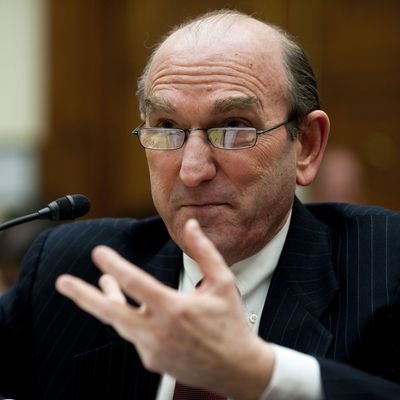
Until Friday, Elliott Abrams was expected to be named the Trump administration’s deputy secretary of State — a powerful position, particularly in a department headed by a former oil executive with no diplomatic experience.
Abrams’s apparent selection was not treated as a scandal. But in a less degenerate republic, it would have been: The last time Abrams worked at the State Department, he helped the Reagan White House covertly sell weapons to Iran — in defiance of an embargo — so as to fund reactionary rebels in Nicaragua, in defiance of a federal law that Congress had passed 411 to 0.
After his crime against the rule of law was exposed, Abrams lied to Congress about what he had done. He eventually pled guilty for that last offense, but was promptly pardoned by our first President Bush.
When Abrams wasn’t undermining democratic rule at home, he promoted genocide abroad. As the Nation’s Eric Alterman writes:
As assistant secretary of state for human rights, Abrams sought to ensure that General Efraín Ríos Montt, Guatemala’s then-dictator, could carry out “acts of genocide”—those are the legally binding words of Guatemala’s United Nations–backed Commission for Historical Clarification—against the indigenous people in the Ixil region of the department of Quiché, without any pesky interference from human-rights organizations, much less the US government.
As the mass killings were taking place, Abrams fought in Congress for military aid to Ríos Montt’s bloody regime. He credited the murderous dictator with having “brought considerable progress” on human-rights issues … When The New York Times published an op-ed challenging the official State Department count of the mass murders under way—by a woman who had witnessed a death-squad-style assassination in broad daylight in Guatemala City without ever seeing it mentioned in the press—Abrams lied outright in a letter to the editor, even citing an imaginary story in a nonexistent newspaper to insist that the man’s murder had, in fact, been reported.
Nevertheless, Abrams persisted. A decade after George H.W. Bush pardoned his crime against Congress, Abrams was plotting coups against democratically elected South American governments — as an adviser to George W.
Later, Abrams oversaw the National Security Council directorate responsible for promoting Democracy, Human Rights — which is a bit like having Hannibal Lecter oversee the directorate of Homicide Reduction and Veganism.
During his campaign, Trump pledged not to surround himself “with those who have perfect résumés but very little to brag about except responsibility for a long history of failed policies and continued losses at war.”
“We have to look to new people because many of the old people frankly don’t know what they’re doing,” the GOP nominee continued, “even though they may look awfully good writing in the New York Times or being watched on television.”
This is a (generous) description of Elliott Abrams. But the president did not hold that against him.
Rex Tillerson and Jared Kushner both lobbied the president on Abrams’s behalf. And, after a meeting with the war criminal, Trump was prepared to make the neoconservative his number-two diplomat.
And then, Trump came upon a column Abrams had written in May 2016, titled “When You Can’t Stand Your Candidate.”
“The party has nominated someone who cannot win and should not be president of the United States,” Abrams wrote. “Do not allow the Republican convention to be a coronation wherein Trump and Trumpism are unchallenged … The party needs to be reminded that there are deep divisions, and Trump needs to be reminded of how many in the party oppose and even fear his nomination.”
Now, Trump has personally vetoed Abrams appointment, according to sources who spoke with CNN.
Let this be a teachable moment for every careerist in Washington: Foment genocides and constitutional crises to your heart’s content, but watch what you say about your co-partisans — some find it difficult to forgive.






























